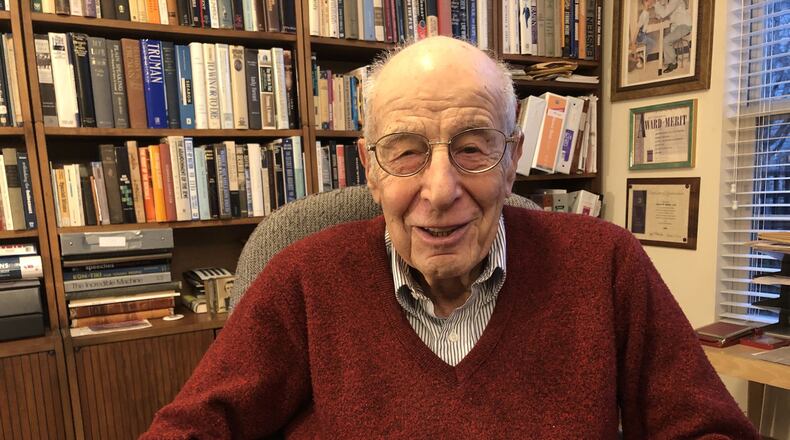MORE McCRABB: McCrabb: Middletown pastor calls bladder cancer diagnosis ‘a blessing’
Miller, who lives in Deerfield Twp. with Janie, 94, his wife of 68 years, has dedicated his adult life to educating people about the Holocaust. He recently read that 50 percent of the population has never heard of the Holocaust.
To reduce that percentage, Miller makes 50 to 60 speaking appearances per year as part of The Center for Holocaust and Humanity Education’s Speakers Bureau and tells thousands of people how he survived the Holocaust and eventually settled in Cincinnati, then Butler County, where he opened his medical practice and raised his family.
To get his point across, Miller doesn’t open history books. He uses personal stories.
He has converted one of the bedrooms into a personal library filled with many books written about the Holocaust. Some people want to hide from their family history, but Miller uses his as a teaching tool. Ask him one question during a one-hour interview at his kitchen table, and his answer may last so long that he eventually asks, “Where was I?”
Here’s one thing he wants to make perfectly clear. It’s important that people — regardless of their age and religious background — understand the damage done by injustice, inhumanity and prejudice.
“Can these things happen again?” he asked. “There is a slogan around that says, ‘Never again.’ I believe the slogan is all baloney. That’s wishful thinking. I believe it can happen again. Nothing in history ever stands alone. Whatever happens is connected to what happened previously. It’s not chiseled in stone the next time it will be Jews. Could be anybody, any group, Christians, Muslims, who knows?”
MORE McCRABB: 80 years later, YMCA still big for this Butler County sports icon
Miller was born in Berlin, Germany in 1922. His family owned a successful clothing company, and he has many happy memories of his early childhood. As an active youth, he enjoyed sports until one day he arrived at his favorite recreation center to find it forbidden to Jews.
He remembers many of his childhood friends joining the Hitler Youth and wearing their uniforms with pride and cutting him out of their lives for being Jewish. He was the last Jewish student to remain in his class until it was made too uncomfortable for him to stay, he said.
While in school, 50 times per week, Miller said the students saluted by saying, “Heil Hitler!” before and after every class.
As a 14-year-old, Miller attended the 1936 Berlin Olympics made famous by American Jesse Owens winning four gold medals and Hitler abruptly leaving the stadium so he wouldn’t have to shake Owens’ hand.
The following year, Miller departed Nazi Germany for Switzerland, a trip that eventually led him to Belgium to Holland, and finally, to London, England. His older brother, Bruce, 16, was sent to England. His parents, Alfred and Charlotte, remained in Germany, enduring Kristallnacht, the night of broken glass, by hiding in a friend’s home.
They ultimately escaped the Nazis because another friend with “tremendous connections” sent a postcard from Holland naming a consulate who could help them replace their travel documents stolen by SS officers, Miller said.
He often wonders what the world lost when 1.5 million children under the age of 15 were needlessly slaughtered by Nazi Germans.
“Can anyone guess what shining stars in medicine, gifted musicians, talented writers, committed artists, dedicated scientists were simply murdered, bulldozed into mass graves, most of them nameless,” Miller said. “The English language does not contain the vocabulary remotely descriptive of the enormity that had been perpetrated on the scale so immense.”
He said it was “unbelievable” the steps Germans took to remove all Jews. He said if they heard that one Jew was hiding 10 miles away, they would track him down and kill him.
MORE McCRABB: ‘Guy with one arm who played sports’ now helping others with disabilities
The family eventually was reunited in England before immigrating to America in 1939. He remembers riding on a boat and seeing the Statue of Liberty off in a distance. He cried then. He almost cried 80 years later.
“This I can not describe,” he said of the symbol of American freedom. “We heard about it. We read about it. Even now I can’t talk about it. Sorry.”
About the Author

